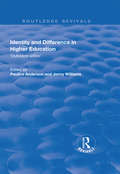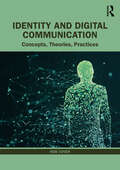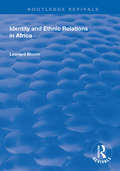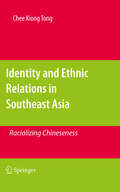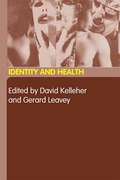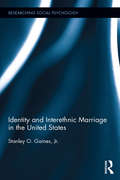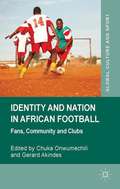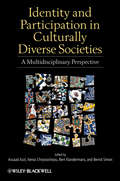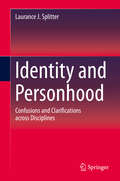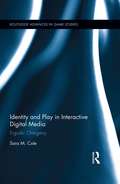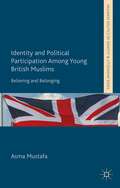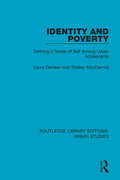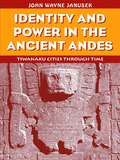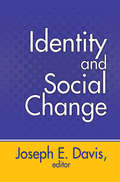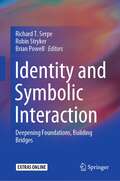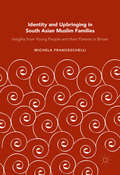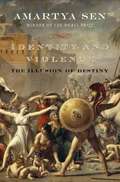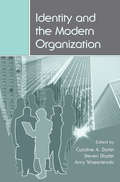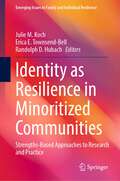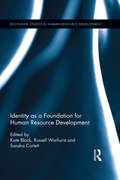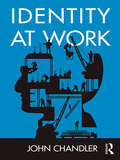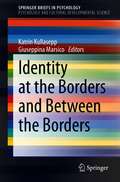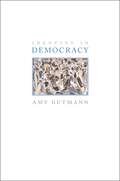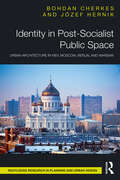- Table View
- List View
Identity and Difference in Higher Education: Outsiders within
by Jenny Williams Pauline AndersonThis title was first published in 2001. This volume brings together contributions from a group of authors who explore the themes of identity and difference in the context of a range of power relationships within higher education.
Identity and Digital Communication: Concepts, Theories, Practices
by Rob CoverThis comprehensive text explores the relationship between identity, subjectivity and digital communication, providing a strong starting point for understanding how fast-changing communication technologies, platforms, applications and practices have an impact on how we perceive ourselves, others, relationships and bodies. Drawing on critical studies of identity, behaviour and representation, Identity and Digital Communication demonstrates how identity is shaped and understood in the context of significant and ongoing shifts in online communication. Chapters cover a range of topics including advances in social networking, the development of deepfake videos, intimacies of everyday communication, the emergence of cultures based on algorithms, the authenticities of TikTok and online communication’s setting as a site for hostility and hate speech. Throughout the text, author Rob Cover shows how the formation and curation of self-identity is increasingly performed and engaged with through digital cultural practices, affirming that these practices must be understood if we are to make sense of identity in the 2020s and beyond. Featuring critical accounts, everyday examples and analysis of key platforms such as TikTok, this textbook is an essential primer for scholars and students in media studies, psychology, cultural studies, sociology, anthropology, computer science, as well as health practitioners, mental health advocates and community members.
Identity and Ethnic Relations in Africa (Routledge Revivals)
by Leonard BloomPublished in 1998, this text asserts that psychologists and sociologists have a professional and personal responsibility to further the "cure" of the damage done by governments. The author draws on his own personal experience of living and working in authoritarian, racist or ethnically-sensitive societies and argues that psychologists and sociologists can and should confront their professions and governments by playing an active, collective, therapeutic role in judging the psychological consequences of legal and political practice. The author is concerned with the critical, deconstructionist roles of psychoanalysis and looks at ethnic identity and culture, psychotherapy and mental health problems and the emotional costs and consequences of Apartheid.
Identity and Ethnic Relations in Southeast Asia
by Chee Kiong TongModern nation states do not constitute closed entities. This is true especially in Southeast Asia, where Chinese migrants have continued to make their new homes over a long period of time, resulting in many different ethnic groups co-existing in new nation states. Focusing on the consequences of migration, and cultural contact between the various ethnic groups, this book describes and analyses the nature of ethnic identity and state of ethnic relations, both historically and in the present day, in multi-ethnic, pluralistic nation states in Southeast Asia. Drawing on extensive primary fieldwork in Malaysia, Singapore, Indonesia, Burma, Vietnam, Thailand and the Philippines, the book examines the mediations, and transformation of ethnic identity and the social incorporation, tensions and conflicts and the construction of new social worlds resulting from cultural contact among different ethnic groups.
Identity and Health
by David Kelleher Gerard LeaveyExperiences of health and illness are fundamental to how we understand ourselves, and the postmodern obsession with body image has made health even more significant in identity formation. The study of subjective experiences of health and illness can also provide a challenge to traditional objective medical knowledge and, given current healthcare interest in user involvement, can highlight the need for change in health service provision.This book explores the interplay between identity and health, private and public, mind and body. Drawing on new material, and using and exploring innovative biographical and narrative methods, it covers a broad range of identities in relation to health and illness, including race, religion, ethnicity, disability, age, body image, sexuality and gender.Identity and Health will be of great interest to academics, researchers and students of sociology, medical anthropology, health and psychology.
Identity and Interethnic Marriage in the United States (Researching Social Psychology)
by Stanley O. Gaines, Jr.Drawing on psychological and sociological perspectives as well as quantitative and qualitative data, Identity and Interethnic Marriage in the United States considers the ways the self and social identity are linked to the dynamics of interethnic marriage. Bringing together the classic theoretical contributions of George Herbert Mead, Erving Goffman, and Erik Erikson with contemporary research on ethnic identity inspired by Jean Phinney, this book argues that the self and social identity—especially ethnic identity—are reflected in individuals’ complex journey from singlehood to interethnic marriage within the United States.
Identity and Nation in African Football
by Chuka Onwumechili Gerard AkindesThe 2010 South African World Cup launched African football onto the global stage. This volume brings together top scholars on African football to explore a range of issues such as gender, identity, nationalism, history, cyber-fandom, the media and fan radicalization.
Identity and Participation in Culturally Diverse Societies
by Assaad E. Azzi Bernd Simon Xenia Chryssochoou Bert KlandermansIdentity and Participation in Culturally Diverse Societies presents an original discussion in an edited volume of how the links between identity, political participation, radicalization, and integration can provide a scientific understanding of the complex issue of coexistence between groups in culturally diverse societies.Offers a scientific understanding of the complex issue of coexistence between groups in culturally diverse societiesUtilizes original theory which combines social psychology, sociology, and political scienceIncludes an original and extensive discussion of combining the concepts of identity and diversityInnovatively and engagingly employs the latest research and state-of-the-art theory
Identity and Personhood
by Laurance J. SplitterThis book approaches the concept of identity from both logical-linguistic and socio-cultural perspectives, and explores its implications for our understanding of who or what we persons really are. In the process, it bridges disciplines that often remain disconnected - most notably analytic philosophy and the social sciences - and offers a novel critique of citizenship and moral education, "identity politics", and other contemporary domains of inquiry. Although the book has a multi-disciplinary focus, it is philosophical in its overall orientation (but accessible to readers from outside philosophy) and educational in its mission (but of interest to readers who are not formally educators). Chapters 2-5 discuss the philosophical and (where appropriate) scientific dimensions of identity, chapters 6-7 explore its socio-cultural dimensions and chapter 8 examines its educational dimensions and implications. The book will be of particular interest to those researching or teaching civics, citizenship education and moral education, as well as those involved in cultural, political and religious studies in a broader sense. It will also appeal to anyone who finds him- or herself wondering about the state of the world in the Twenty-First Century, and who suspects that rethinking what it means to be a person in that world might not be a bad idea.
Identity and Play in Interactive Digital Media: Ergodic Ontogeny (Routledge Advances in Game Studies)
by Sara M. ColeRecent shifts in new literacy studies have expanded definitions of text, reading/viewing, and literacy itself. The inclusion of non-traditional media forms is essential, as texts beyond written words, images, or movement across a screen are becoming ever more prominent in media studies. Included in such non-print texts are interactive media forms like computer or video games that can be understood in similar, though distinct, terms as texts that are read by their users. This book examines how people are socially, culturally, and personally changing as a result of their reading of, or interaction with, these texts. This work explores the concept of ergodic ontogeny: the mental development resulting from interactive digital media play experiences causing change in personal identity.
Identity and Political Participation Among Young British Muslims
by Anthony Heath Asma MustafaThis book tackles unanswered questions on British Muslims and political participation: What makes religion a salient 'political' identity for young Muslims (over any other identity)? How do young British Muslims identify themselves and how does it relate to their political engagement? A fascinating insight into the lives of young British Muslims.
Identity and Poverty: Defining a Sense of Self among Urban Adolescents (Routledge Library Editions: Urban Studies)
by Laura DeHaan Shelley MacDermidThis book, first published in 1996, examines an important developmental transition: the formation of identity, as well as the influence that having a well-developed identity may have, on a sample of adolescents living in urban Chicago. This study proposes that identity commitment, exploration, and continuity will be associated with positive psychological and behavioural outcomes for adolescents. This title will be of interest to students of sociology, psychology and urban studies.
Identity and Power in the Ancient Andes: Tiwanaku Cities through Time
by John Wayne JanusekThe Tiwanaku state was the political and cultural center of ancient Andean civilization for almost 700 years. Identity and Power is the result of ten years of research that has revealed significant new data. Janusek explores the origins, development, and collapse of this ancient state through the lenses of social identities--gender, ethnicity, occupation, for example--and power relations. He combines recent developments in social theory with the archaeological record to create a fascinating and theoretically informed exploration of the history of this important civilization.
Identity and Social Change
by Joseph E. DavisIdentity and Social Change examines the thorny problem of modern identity. Trenchant critiques have come from identity politics, focusing on the construction of difference and the solidarity of minorities, and from academic deconstructions of modern subjectivity. This volume places identity in a broader sociological context of destabilizing and reintegrating forces.The contributors first explore identity in light of economic changes, consumerism, and globalization, then focus on the question of identity dissolution. Zygmunt Bauman examines the effects of consumerism and considers the constraints these place on the disadvantaged. Drawing together discourses of the body and globalization, David Harvey considers the growth of the wage labor system worldwide and its consequences for worker consciousness. Mike Featherstone outlines a rethinking of citizenship and identity formation in light of the realities of globalization and new information technologies.Part two opens with Robert Dunn's examination of cultural commodification and the attenuation of social relations. He argues that the media and marketplace are part of a general destabilization of identity formation. Kenneth Gergen maintains that proliferating communications technologies undermine the traditional conceptions of self and community and suggest the need for a new base for building the moral society. In the final chapter, Harvie Ferguson argues that despite the contemporary infatuation with irony, the decline of the notion of the self as an inner depth effectively severs the long connection between irony and identity.
Identity and Symbolic Interaction: Deepening Foundations, Building Bridges
by Brian Powell Robin Stryker Richard T. SerpeThis book examines identity theory’s centrality within social psychology and its foundations within structural symbolic interaction, highlighting its links not only to other prominent sociological subfields, but also to other theoretical perspectives within and beyond sociology. The book provides a synthetic overview outlining the intellectual lineage of identity theory within structural symbolic interactionism, and how the “Indiana School” of identity theory and research, associated especially with Sheldon Stryker, relates to other symbolic interactionist traditions within sociology. It also analyses the latest developments in response to the push to integrate identity theory, which initially focused on role identities, with the study of personal, group and social identities. Further, it discusses the relationship between identity theory and affect control theory, providing a sense of the many substantive topics within sociology beyond social psychology for which the study of identity has important, sometimes underappreciated implications. The book concludes with a chapter summarizing the interrelated lessons learned while also reflecting on remaining key questions and challenges for the future development of identity theory.
Identity and Upbringing in South Asian Muslim Families: Insights from Young People and their Parents in Britain
by Michela FranceschelliWhat is it like to grow up as a South Asian British Muslim today? What are the experiences of South Asian Muslim parents bringing up their children in contemporary Britain? Identity and Upbringing in South Asian Muslim Families explores these questions within the context of the series of events which, from 9/11 to the recent upsurge of the Islamic State, have affected the perceptions and the identity of Muslims around the world. Franceschelli reveals the complex range of negotiations behind the coming of age of South Asian Muslim teenagers and reflects on the changes and continuities between their life experiences, priorities and aspirations compared to their parents' generation. Based on primary research with South Asian Muslim young people and parents, this book highlights the importance of Islam to upbringing; the shifting value of South Asian cultural norms in Britain; and the persistent influence of class in shaping inequalities amongst families and on young people's experiences of growing up.
Identity and Violence: The Illusion of Destiny
by Amartya SenThe 1998 Nobel Laureate in economics, Sen (Harvard U.) responds to what he calls the appalling effects of the miniaturization of people. This happens, he explains, when in order to stop violence, people are reduced to a single identity--for example a moderate Shi'ite or a Hindu nationalist--that authorities believe they can address without considering all the other dimensions of reality each person occupies. Annotation ©2006 Book News, Inc., Portland, OR (booknews.com)
Identity and the Modern Organization (Series In Organization And Management Ser.)
by Caroline A. Bartel Steven L. Blader Amy WrzesniewskiIdentity and the Modern Organization presents a lively exchange of ideas among psychology and management scholars on the realities of modern organizational life and their effect on the identities that organizations and their members cultivate. This book bridges the domains of psychology and management to facilitate a multi-disciplinary, multi-level
Identity as Resilience in Minoritized Communities: Strengths-Based Approaches to Research and Practice (Emerging Issues in Family and Individual Resilience)
by Julie M. Koch Erica E. Townsend-Bell Randolph D. HubachThis book examines strengths-based approaches to understanding and celebrating diverse populations. It centers on understanding the ways in which minoritized group identities and membership in such communities can serve as sources of strength. The volume explores the varied dimensions of minoritized identities and challenges traditional concepts of what it means to be resilient. It presents research-based and innovative strategies to understand more thoroughly the role of resilience and strengths in diverse populations and families. The book addresses the need to consider affirmative, liberation, and strengths-based models of resilience.Key areas of coverage include:Families of transgender and gender diverse people.The role of chosen family in LGBTQ communities.Latinx LGBTQ families.The Indian Child Welfare Act.Celebration of Black girl voices.Homeschooling as a resilience factor for Black families.Black identity and resilience related to mental health.Black resilience in families.Identity as Resilience in Minoritized Communities is a must-have resource for researchers, professors, and graduate students as well as clinicians and related professionals in developmental psychology, family studies, clinical child and school psychology, cultural psychology, social work, and public health as well as education policy and politics, behavioral health, psychiatry, and all related disciplines.
Identity as a Foundation for Human Resource Development (Routledge Studies in Human Resource Development)
by Kate Black Russell Warhurst Sandra CorlettHuman Resource Development (HRD) involves the design, delivery and evaluation of learning and/or training interventions within organisations to improve the work performance of individuals and groups. This edited collection will demonstrate the potential of identity theorising for problematizing and reconceptualising HRD activities. Identity will thus be established as a foundation for enhancing HRD policy and practice. While identity has emerged as a key focus for theoretical debate and for empirical research within management and organisational studies, the potential of identity as a new paradigm for understanding learning and for examining HRD more broadly is still emergent. That identity has such potential can be seen in the increasing recognition that training and development for many contemporary occupations represents nothing less than a "project of the self". Identity as a Foundation for Human Resource Development will complete a gap in the market providing sound, single source, theoretical foundations from the latest trends in identity theorising, now a key area of organisation studies, and apply these to HRD policy and practice. The emphasis throughout will be on informing HRD policy and practice, research and education the book includes a chapter on resources and techniques for HRD educators. In short, the book will "put identity to work" for HRD scholars. The intended audiences are Human Resource Development scholars, academics, students and professionals, this exciting new volume will provide a thoughtful theoretical analysis and operational practise for modern HRD.
Identity at Work
by John ChandlerThis insightful book draws on a range of contemporary and classic studies to explore the connection between the personal experience of work and the wider social structures in which it takes place. Identity at Work examines key social identities relevant to the workplace, such as those based on gender, sexual orientation, ethnicity and race, disability, age, occupation, class and organizational membership. Using research from a wide variety of countries and academic approaches, this book provides a readable and engaging introduction to the issues, exploring how people experience work, understand and present themselves at work, and relate to others. Providing an accessible investigation of work and identity, this text will be valuable to students looking at organizational behaviour, HRM, diversity management and the sociology of work.
Identity at the Borders and Between the Borders (SpringerBriefs in Psychology)
by Giuseppina Marsico Katrin KullaseppWithin the general framework of Cultural Psychology, this book provides different perspectives on the relationship between border and identity by experts from several disciplines (i.e. history, psychology, geography etc.). The book offers an “in- depth” comprehension of the intricacy of the border making process and how this affect the identity formation from a psychological, social and cultural point of views. The book takes a close look to some European countries as specimens to investigate the complex link between creation of national/ethnic identity and bordering process that evoke the more general question of the I-OTHER relation.This book provides an integrated insight into the complex phenomenon of borders and identity. The process of making and negotiating border and the identity formation on the border is analyzed as psychological, social, historical, and cultural phenomena.This Brief will be of interest to researchers and students as well as diplomats and administrative policy makers within the fields of political science, psychology, cultural psychology, and sociology.
Identity in Democracy
by Amy GutmannWritten by one of America's leading political thinkers, this is a book about the good, the bad, and the ugly of identity politics.Amy Gutmann rises above the raging polemics that often characterize discussions of identity groups and offers a fair-minded assessment of the role they play in democracies. She addresses fundamental questions of timeless urgency while keeping in focus their relevance to contemporary debates: Do some identity groups undermine the greater democratic good and thus their own legitimacy in a democratic society? Even if so, how is a democracy to fairly distinguish between groups such as the KKK on the one hand and the NAACP on the other? Should democracies exempt members of some minorities from certain legitimate or widely accepted rules, such as Canada's allowing Sikh members of the Royal Canadian Mounted Police to wear turbans instead of Stetsons? Do voluntary groups like the Boy Scouts have a right to discriminate on grounds of sexual preference, gender, or race? Identity-group politics, Gutmann shows, is not aberrant but inescapable in democracies because identity groups represent who people are, not only what they want--and who people are shapes what they demand from democratic politics. Rather than trying to abolish identity politics, Gutmann calls upon us to distinguish between those demands of identity groups that aid and those that impede justice. Her book does justice to identity groups, while recognizing that they cannot be counted upon to do likewise to others. Clear, engaging, and forcefully argued, Amy Gutmann's Identity in Democracy provides the fractious world of multicultural and identity-group scholarship with a unifying work that will sustain it for years to come.
Identity in Post-Socialist Public Space: Urban Architecture in Kiev, Moscow, Berlin, and Warsaw
by Józef Hernik Bohdan CherkesThis book is a comparative analysis of the architecture of central public spaces of capital cities in Central and Eastern Europe during the period of their authoritarian and post-authoritarian development. It demonstrates that national identity transformations cause structural changes in urban public spaces, and theorises identity and national identity within urban planning in order to explain the influence of historical, cultural, mental, social as well as ideological and political conditions on the processes of shaping and perceiving the architecture of public space. The book addresses the process of shaping and restructuring historic centres of European capital cities of Kiev, Moscow, Berlin, and Warsaw, which developed under authoritarian regime conditions throughout the 20th century and were characterised by ideological determinism and the influence of state ideology and politics on the architecture of public spaces. The book will be useful for urban planners, architects, land management specialists, art historians, political scientists, and readers interested in the theory and history of cities, the fundamentals of urban planning and architecture, and the planning of cities and public spaces.
Identity in Post-Socialist Public Space: Urban Architecture in Kiev, Moscow, Berlin, and Warsaw (Routledge Research in Planning and Urban Design)
by Józef Hernik Bohdan CherkesThis book is a comparative analysis of the architecture of central public spaces of capital cities in Central and Eastern Europe during the period of their authoritarian and post-authoritarian development. It demonstrates that national identity transformations cause structural changes in urban public spaces, and theorises identity and national identity within urban planning in order to explain the influence of historical, cultural, mental, social as well as ideological and political conditions on the processes of shaping and perceiving the architecture of public space. The book addresses the process of shaping and restructuring historic centres of European capital cities of Kiev, Moscow, Berlin, and Warsaw, which developed under authoritarian regime conditions throughout the 20th century and were characterised by ideological determinism and the influence of state ideology and politics on the architecture of public spaces. The book will be useful for urban planners, architects, land management specialists, art historians, political scientists, and readers interested in the theory and history of cities, the fundamentals of urban planning and architecture, and the planning of cities and public spaces.
